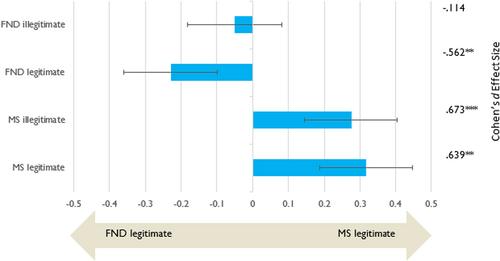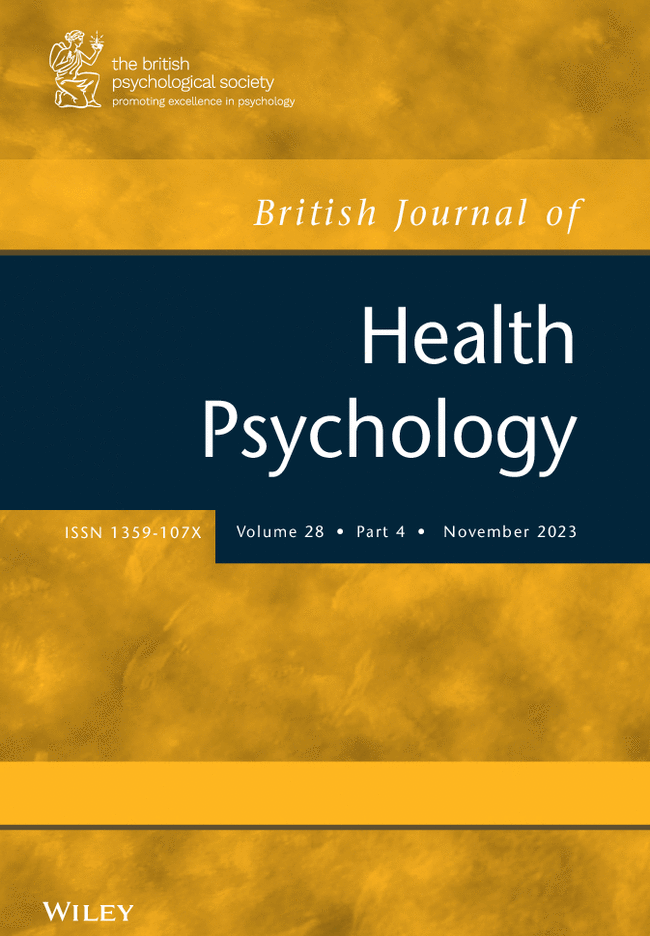Clinicians' implicit and explicit attitudes about the legitimacy of functional neurological disorders correlate with referral decisions
IF 3.5
2区 心理学
Q1 PSYCHOLOGY, CLINICAL
引用次数: 1
Abstract
OBJECTIVES Uncertainty regarding the legitimacy of functional neurological disorder (FND) remains among some health care professionals. Despite treatment guidelines and consensus recommendations, variability in clinical practice referral decisions persists. Evidence from other conditions suggests such clinical decision making is impacted by practitioners' implicit and explicit attitudes. We aimed to identify whether health care professionals hold implicit and/or explicit attitudes about the legitimacy of FND and whether these attitudes are associated with referral decision making. DESIGN/METHODS We included 66 health care professionals who work with people with neurological conditions: n = 37 medical doctors, mainly neurologists (n = 18) and psychiatrists (n = 10), and n = 29 doctoral level practitioner psychologists. Participants completed an Implicit Association Test (IAT), Implicit Relational Assessment Procedure (IRAP), a referral decision-making vignette task and self-report measures of explicit attitudes on FND-legitimacy, therapeutic optimism and clinician confidence. Multiple Sclerosis (MS) was used as a comparator condition. RESULTS Participants self-reported strong explicit FND-legitimate and MS-legitimate attitudes but demonstrated an implicit FND-illegitimate/MS-legitimate bias. Deeper examination provided by the IRAP data indicated pro-FND-legitimate attitudes, but no bias for or against FND-illegitimate-contrasting the pro-MS-legitimate, anti-MS-illegitimate attitudes for the comparator condition. Attitudes about FND-illegitimacy were negatively associated with likelihood of referral to physical interventions such as physiotherapy. Medical doctors had lower treatment optimism and stronger explicit attitudes that FND is illegitimate than psychologists. CONCLUSIONS At an implicit level, clinicians are uncertain about the illegitimacy of FND, and such attitudes are associated with lower likelihood of referral to physiotherapy in particular. Improved education on FND among health care professionals is indicated.

临床医生对功能性神经系统疾病的合法性的隐式和显性态度与转诊决定相关
目的关于功能性神经障碍(FND)的合法性的不确定性仍然存在于一些卫生保健专业人员中。尽管有治疗指南和共识建议,临床实践转诊决定的可变性仍然存在。来自其他条件的证据表明,这种临床决策受到从业人员内隐和外显态度的影响。我们的目的是确定卫生保健专业人员是否对FND的合法性持有隐性和/或显性态度,以及这些态度是否与转诊决策有关。设计/方法我们纳入66名与神经系统疾病患者一起工作的卫生保健专业人员:n = 37名医生,主要是神经科医生(n = 18)和精神科医生(n = 10), n = 29名博士级执业心理学家。参与者完成了内隐关联测验(IAT)、内隐关系评估程序(IRAP)、转诊决策小片段任务和对fnd合法性、治疗乐观主义和临床医生信心的外显态度的自我报告测量。多发性硬化症(MS)作为比较条件。结果参与者自我报告强烈的明确的fnd -合法和ms -合法态度,但表现出内隐的fnd -非法/ ms -合法偏见。IRAP数据提供的更深入的研究表明,在比较条件下,亲ms -合法和反ms -非法的态度对比,支持fnd -合法的态度没有偏见,但反对fnd -非法的态度没有偏见。对fnd私生子的态度与转诊到物理干预(如物理治疗)的可能性呈负相关。与心理医生相比,医生对治疗的乐观态度较低,对FND不正当性的明确态度较强。在隐性层面上,临床医生不确定FND的非法性,特别是这种态度与转诊到物理治疗的可能性较低有关。报告指出,卫生保健专业人员应加强对失踪者的教育。
本文章由计算机程序翻译,如有差异,请以英文原文为准。
求助全文
约1分钟内获得全文
求助全文
来源期刊

British Journal of Health Psychology
PSYCHOLOGY, CLINICAL-
CiteScore
14.10
自引率
1.30%
发文量
58
期刊介绍:
The focus of the British Journal of Health Psychology is to publish original research on various aspects of psychology that are related to health, health-related behavior, and illness throughout a person's life. The journal specifically seeks articles that are based on health psychology theory or discuss theoretical matters within the field.
 求助内容:
求助内容: 应助结果提醒方式:
应助结果提醒方式:


